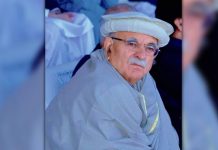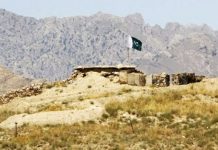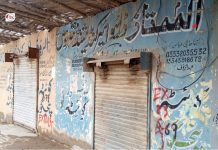Author: Hazaran Baloch
Four lifeless bodies were thrown in the dark of night, nameless and unknown, at Banuk e Chadai in Turbat. Only one body, placed in a coffin, made its journey to Shaheed Fida Ahmed Chowk.
The coffin was positioned in the heart of Shaheed Fida Ahmed Chowk. Initially, the gathering was small, with a sister mourning, cursing, and invoking God as her head rested on the coffin. As the day progressed, the crowd grew. The next day, Shaheed Fida Ahmed Chowk resonated with the sister’s cries, chanting “Balochistan Zendag Baat” (Long Live Balochistan). Despite the body in the coffin losing its shape, the overpowering stench enveloped the entire region. People from across Balochistan joined spontaneously. This coffin drew them in, uninvited and unpaid, a poignant testament to their awareness of the unfolding genocide.
The coffin remained there, and some individuals arrived, urging the family to bury the body and invoking Baloch codes of ethics. However, this coffin had become a symbol for Balochistan, embraced by the people. The family, considering it a sacrifice for Balochistan, placed it in Shaheed Fida Ahmed Chowk. The Baloch Yakhjeti Committee (Kech) announced the burial of the coffin while continuing the protest.
On the day of burial, thousands of men and women, young and old, irrespective of Zigri and Nimazi affiliations, joined. Both men and women participated in the Janaza, marching on foot to Koh-e-Muraad, a pilgrimage site with a separate area known as the martyrs’ graveyard. The journey was long and stonious, but people’s spirits were unbreakable. Upon reaching Koh-e-Murad, amidst the rocky terrain, thousands buried the coffin in Shoda-Kabristan.
The next day, an empty coffin stood at Shaheed Fida Ahmed Chowk, symbolizing an end to more dead bodies and highlighting the failure of Pakistan’s law and judiciary system.
Balach, who was forcefully disappeared by CTD officials and killed over 20 days later, was paradoxically presented in front of the court. Scheduled for a court appearance the following day, he was killed at night. Balach’s coffin made history as perhaps the only one presented in court, as protestors took it to the trial location where he was supposed to be tried freely.
Balach continues to live through every era and form. Balach lives on. Now, families of missing persons, even from the Kech district, where cases were never registered, joined the cause. Their common desire is to prevent their children from becoming lifeless bodies.
The night at Shaheed Fida Ahmed Chowk echoed with the silent curses of Nako Mayar, a 75-year-old shepherd with nothing left but his herd. His only son, Fateh, a 9th class student, was forcefully disappeared. Days at Fida Ahmed Chowk were filled with the tears of Rafeeq Oman’s missing daughter. New families joined daily, not only from the Kech district but also from Pasni, Gwadar, Tump, and other areas. Balach’s coffin instilled hope for them not to remain silent.
A registration camp for Baloch missing persons was established at Shaheed Fida Ahmed Chowk, registering cases across Balochistan and Baloch communities in Karachi.
The movement sparked by Balach’s killing has now engulfed the entirety of Balochistan. A week after Balach’s burial, the sit-in-Dharna transformed into a long march against the Baloch Genocide. On December 6, 2023, the march initiated by the Baloch Yakhjeti Committee began its journey from Turbat to Quetta and eventually Islamabad. At every station, families joined the march, and those unable to participate handed over pictures of their loved ones to fight their cases.
The march passed through Shapuk, Tejaban, Hoshab, and Hirronk and reached Panjgur at night. After a day’s stay on December 7, a massive rally involving thousands of people was held. The march continued to Naag, Besima, and Greshag and reached Naal on December 8. The scenes at Naal echoed the era of Zakir Majeed.
People clutched pictures of the missing Zakir Majeed, a reminder that even after 14 years, the city still bears and carries the weight of Zakir Majeed’s presence and absence.
On December 9, Naal Bazar witnessed a surge of protestors, boosting the caravan’s spirit. However, after the rally, FIRs were filed against the people in Naal.
Every path the caravan traversed was warmly welcomed, with massive rallies conducted in each area, providing support and hope to the caravan.
Following the protest in Naal, the long march proceeded towards Khuzdar, where the road was blocked with containers. Despite the challenges, the march managed to overcome this obstacle, and upon reaching Khuzdar, thousands of people joined despite the fear of death squads. A huge rally was held in Shaheed Professor Abdul Razzaq Chowk. The march stayed in Khuzdar for a day before heading to Surab, Kalat, and Manguchar, where vans were restricted to not transporting the participants of March. The area resembled a red zone with heavy police presence, but after several hours, the march successfully navigated through and arranged vans for their onward journey.
On December 10, as the caravan left for Surab and Kalat, the route was filled with hurdles, and roads were blocked with containers. It took hours to reach, and after crossing Surab, police baton-charged Zeeshan, the son of missing Zaheer. The road was eventually cleared, and after a warm welcome in Kalat, the caravan proceeded to Manguchar. After staying for the night, a protest rally was held on December 11. The march continued to Mastung and reached Quetta on December 11 despite encountering blocked roads.
Despite the extreme cold weather, the sit-in persisted in Saryab, Quetta, for four days. People endured the freezing temperatures at night, with the fire set for warmth, creating chaos in their eyes and causing coughs. However, the spirit of the people remained unshaken.
After a 4-day sit-in-dharna at Saryab, Quetta, the long march commenced its journey towards Islamabad, passing through Kohlu, Bharkan, DG Khan, Taunsa and DI Khan.
From Quetta to Islamabad, the March reached its first station at Kohlu at night. The morning in Kohlu witnessed an extraordinary strength of people on the land of Khair Baksh Marri and Balach, with thousands gathered, and later on, the people in Kohlu were lodged with FIR.
The march’s next destination was Barkhan, where, once again, hundreds of people welcomed the marchers, embodying the Baloch spirit of unity.
As the march approached Barkhan, the police, aiming to escalate fear, arrested four Baloch students in DG Khan. After leaving Barkhan and marching towards DG Khan, the police closed the main roads and all routes leading to the main DG. Various arrests, including both males and females going to welcome the march, took place. Upon reaching DG Khan, out of protest, the marchers initiated a dharna, demanding the release of those arrested. Despite road closures, people from across DG Khan crossed miles to support and welcome the march, and later on, people of DG Khan faced FIR.
With closed roads and no available transportation for the march towards Taunsa by the Police, the participants of the march decided to embark on a long march on foot. After covering some miles on foot, transportation was eventually arranged for the marchers.
Upon reaching Taunsa, the march again ignited with thousands of Baloch, extending a warm welcome, offering support, and reinforcing mutual unity.
After a night stay at Taunsa, the march continued towards DI Khan and Islamabad. In DI Khan, the march was welcomed by both Baloch and Pashtoon communities. Prominent figures like PTM leader Manzoor Pashteen’s mother, Ali Wazeer, and many others came to show their solidarity with the Baloch March against genocide.
Thousands of people welcomed and protested with them at each destination until their final stop in Islamabad on 20th December.
The march has now reached Islamabad.
Some families of missing persons were already protesting in front of Islamabad Press Club. A considerable number of Baloch students gathered to welcome the march, which covered thousands of kilometers to reach Islamabad. While some protestors managed to welcome them, most remained at the press club as the marchers were initially routed to the Press club.
But in Islamabad, a different plan seemed to be in place. The police presence outnumbered the protestors and marchers. The marchers were halted at Tool Plaza, Islamabad, and those sitting in front of the Press Club were not allowed to welcome them.
The marchers were at Tool Plaza, continuing their sit-in as the police blocked the road. Simultaneously, the protestors sitting in front of the Islamabad Press Club continued their sit-in. However, Islamabad authorities chose their way to welcome the tired elderly people. In the middle of the night, in extremely cold weather, Islamabad police decided to disperse the women and men of the marchers forcefully. They beat them, arrested them one by one, and subjected them to mistreatment. Simultaneously, police at Press Club used water cannons and conducted shelling, sparing no one. Every person, even the injured ones taken to hospitals, was arrested and mistreated.
The marchers faced a brutal crackdown by the Islamabad administration and agencies. Men, women, victim families, and students present in solidarity—every single Baloch was subjected to severe beatings, shellings, water cannons, and imprisonment.
The situation remained shrouded in mystery, with no news of the arrested marchers and students. Then, on the evening of December 21, screams echoed from Baloch women being forcibly dragged to leave for Quetta. They were beaten and tortured, but none were willing to comply. Despite the police managing to force them into a bus, the marchers inside locked the gate, and the bus driver refused to be part of the oppression. These determined Baloch marchers, despite sleeplessness, high fever, beatings, and pain, continued their resistance. The entire police force failed to transport them back to Quetta. However, this conduct by the Islamabad administration has strained Baloch’s relations with Punjab.
This Movement against the Baloch genocide began with the blood of Balach, which made its way towards Turbat, and it carried its stench with it wherever it reached; from Makran to DG, even internationally, it wafted over everyone. From Makran to DG Khan, it’s the march of every Baloch, men and women alike. A march for survival, for hope, for faded dreams—against genocide, sending a clear message to the state: we reject any more dead bodies.
Exhausted victim families, with nothing left for them, embarked on this journey for hope and survival. Those unable to join due to compulsion handed over pictures of their loved ones with trembling hands, pleading to fight their cases. Despite clinging to this hope, the events in Islamabad shattered any prospect of rising hope for the Baloch. They no longer believe in the state, recognizing their severed ties with Islamabad. Now, they know that to demand justice from whom? Those who kill and disappear?
These victim families have traversed a long road, carrying their dreams, hopes, and ambitions. The March from Turbat to Islamabad holds their misery and despair, strength and weakness, past and future. Reaching Islamabad seemed like unlocking the door of their destiny; all eyes fixed on that door. Yet, here we are, drawing the line between the oppressor and the oppressed; it marks our end and beginning.
Disclaimer: The views and opinions expressed in this article are those of the author and do not necessarily reflect the official policy or position of The Balochistan Post or any of its editors.





























